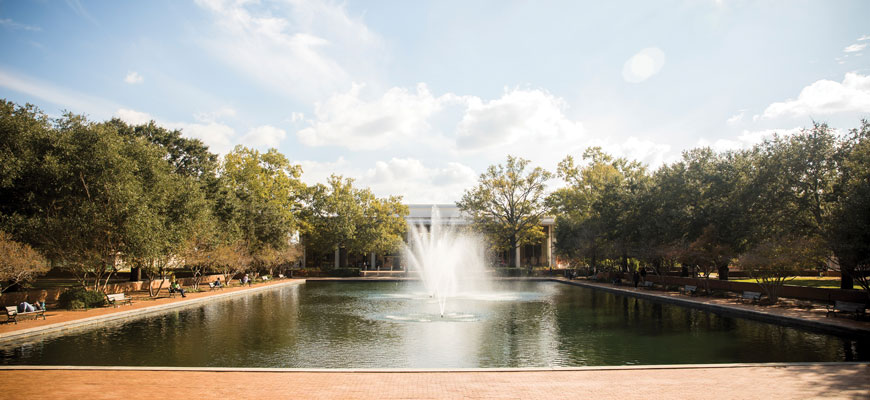
The COVID Chronicles
University Libraries researchers developing archive of UofSC's response to pandemic
Posted on: November 12, 2020; Updated on: November 12, 2020
By Megan Sexton, msexton@mailbox.sc.edu
As the spread of COVID-19 closed campus and changed life in Columbia, University of South Carolina researchers quickly understood the importance of keeping a historical record of their institution’s response and reaction to the coronavirus pandemic.
A team of researchers from University Libraries has stepped up to document the official actions and personal stories at the university.
“Our mission is to collect, preserve and disseminate archival research materials about South Carolina and South Carolinians. As we got into it, we decided that focusing on USC seemed like a manageable way to do this,” says Graham Duncan, head of collections and curator of manuscripts at the South Caroliniana Library.
The project, “Documenting COVID-19 at the University of South Carolina,” is designed to collect, preserve and make available primary source materials documenting the effects of the coronavirus on the university, along with the university’s response and recovery. Faculty, staff and students are invited to share their stories of how COVID-19 affected them.
The archive will help future researchers understand how the university and its faculty, staff and students managed the logistical, technological, economic and psychological challenges posed by the pandemic.
“We talked about it in connection to past pandemics. We have a lot [of information] on the 1918-19 pandemic, but a lot of it is official government documents and administrative documents. Those are important, but it’s also important to tell a personal or social history. How did this affect the day-to-day lives of people and how did they respond to it?” Duncan says. “That was the idea behind pursuing the project.”
Different perspectives come together to tell a full story about the impact on the university.
Andrea L’Hommedieu, director of the oral history department at the University Libraries
The pandemic changed many things about life on campus — including how the library collects material.
“My job is to make contact with donors of physical materials. That’s not possible now,” says Duncan. “At this point, all the materials we’ve collected aren’t physical items; we’re thinking more digital.”
Duncan, the principal investigator on the project, has teamed with others at University Libraries — Elizabeth West, Beth Bilderback, Andrea L’Hommedieu, Lance Dupre and Edward Blessing — on the project.
Researchers also have formed a diverse advisory board from across campus to solicit ideas and suggestions. In addition, the library is planning to record oral histories about the pandemic.
Jenna Conant, who earned her master’s in 2019 from the School of Library and Information Science, is the digital archivist for the project. She has created a webpage and set up an online submission form allowing people to upload their materials and include background that will be necessary when the documents are archived.
By early summer, they had received a wide variety of submissions, including a series of poems, journal entries, photographs, student podcasts and other items. West, the university’s archivist, is also collecting the official university policies and documents related to the pandemic response.
The archive will continue to grow through the fall semester, and will include the addition of student reflection papers expected from a history class being taught this fall.
“It’s anything and everything. As archivists, we don’t make the judgment calls. It’s up to future researchers to determine how to use materials,” Duncan says. “It can be used across the university. Plenty of departments and academic units can make use of it. At a high level, we hope it can provide the university some information in the future should something like this happen again.”
Telling the stories of COVID-19
Everyone at the University of South Carolina has a story to tell about living through the coronavirus pandemic. Andrea L’Hommedieu, director of the oral history department at the University Libraries, is taking steps to collect them.
As part of the “Documenting COVID-19 at the University of South Carolina” project, L’Hommedieu and her colleagues will interview people around the university — students, faculty, staff and administrators — to help document the effects of the coronavirus and the university’s response and recovery.
“It’s important to have that perspective, a first-person memory of the event. We’re all experiencing this, and we’re all being affected in different ways,” L’Hommedieu says. “We want to talk to people in many different areas of university about how they responded to the pandemic. How has their life changed? Have they found silver linings in this time?”
The research project’s advisory board will recommend people to be interviewed for the oral histories, making sure the researchers draw from a variety of sources. L’Hommedieu says she also is interested in hearing from people around the university who might have an interesting perspective to share through an oral history. She expects to interview at least 15 people.
“If you’re talking to administrators tasked with preparation and reopening the university, they’ll have a different perspective than a student studying abroad who was brought back, or other students who may have had internships that had to be modified. Different perspectives come together to tell a full story about the impact on the university.”